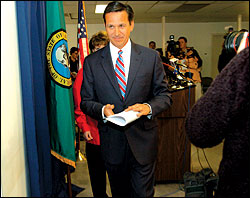Republican Dino Rossi should have apologized to Washington state. On Monday, June 6, after seven months of irresponsible rhetoric and fruitless litigation by his lawyers and spinmeisters, Rossi finally ended his bid for the governorship. He did not, however, take personal responsibility for his headline-grabbing, whiny, and expensive litigation. Instead, Rossi took a page out of the playbook of U.S. House Majority Leader Tom DeLay, R-Texas, making an ad hominem attack on the integrity of the state’s highest court. It was as baseless as the rest of his legal arguments and should serve as a reminder that Rossi is deeply wedded to the radical right-wing agenda emanating from D.C.
Rossi stopped his crusade because of a ruling by Chelan County Superior Court Judge John Bridges in Wenatcheethat morning. Ruling from the bench in the matter of Borders et al. v King County et al., Bridges issued a stunning repudiation of every bogus legal argument put forth by Rossi’s attorneys in a two-week civil trial in which they sought to overturn the 129-vote victory last November of Democratic Gov. Christine Gregoire.
Appeals courts, like the Washington Supreme Court, are not fact-finding bodies. They rule on the application of the law by trial courts and generally defer to a trial court when it comes to determining facts in a case. Bridges, practically handpicked by the Republicans to hear the case, made a GOP appeal difficult, if not impossible. He ruled that not only were Rossi’s legal theories unacceptable, the established facts actually upheld Gregoire’s victory—even if a higher court could disagree with him about the theories. Says Loyola Law School professor Rick Hasen, an elections specialist: “The judge said, ‘Even if I am wrong about the standard, Christine Gregoire rather than Dino Rossi is the winner.'”
Rossi’s lawyers argued there was evidence of fraud in the 2004 election. Their proof? Some random precincts showed some administrative errors that could not be explained by King County elections officials. There were some opportunities for monkey business when county workers transported ballots (as there are in every election) from one county vendor to another without observers present (the political parties could have sent observers but didn’t). In his ruling, Bridges chastised King County, and especially its elections workers, for sloppiness. He reiterated, however, that the GOP had not made a claim of fraud in the initial petition, so it could not properly argue that at trial. And he went further: “No evidence has been placed before the court of fraud.” This means that if a higher court found the judge was incorrect in excluding the claim of fraud from the trial, there was no evidence to support it in any event.
The Republicans’ other main argument met a similar fate. To show that Gregoire had received more illegal votes than Rossi, they proffered a method of “proportional deduction” that assumed that illegal voters—despite the fact that the overwhelming number of them were male felons—voted like other people in their neighborhoods. Bridges found the science behind that analysis so suspect that it did not pass the lowest legal test of usefulness. “This is not consistent with generally accepted scientific standards,” the judge said. Again, he went further. In case a higher court should find that he erred in not considering proportional deduction, Bridges applied it anyway as an intellectual exercise, using the 1,678 votes that the court determined were illegal. His finding: “Ms. Gregoire would have prevailed.”
The complete legal rout delivered by the judge came as no surprise to Seattle University law professor John Strait. “It’s pretty much what I would have expected,” says Strait. “I’m not sure that the Republicans ever thought they would reverse the results of the election. This was an organizing tool for them.”
Rossi, accompanied by his wife, Terry, took the podium at his Bellevue campaign office at 5 p.m. and took one last cheap shot before ending his 2004 campaign for governor. “Because of the makeup of the Washington state Supreme Court, which makes it almost impossible to overturn this ruling, I am ending the election contest,” he said.
Indeed, there are justices who have backgrounds that would render them suspect in Rossi’s eyes. Justice Bobbe Bridge was an active Democrat, Mary Fairhurst worked for Gregoire when the governor was attorney general, Tom Chambers was a leading trial attorney, and Barbara Madsen’s first campaign for judge was fueled by outrage over the nomination hearings for U.S. Supreme Court Justice Clarence Thomas. But Rossi would be hard-pressed to find ideological objections to Justices Charles Johnson and Susan Owens. And some of the court’s members have conservative backgrounds. The chief justice, Gerry Alexander, was active in Republican politics before taking the bench. Justice Jim Johnson worked for and was bankrolled in his campaign by Rossi’s most important special interest group, the rabidly conservative Building Industry Association of Washington. And Justice Richard Sanders is libertarian. If one were to assume justices didn’t think for themselves and parse the Supreme Court politically, that would add up to four left-leaners, two swing votes, and three conservatives. Hardly overwhelming ideological odds.
More importantly, the state Supreme Court has a deserved centrist reputation in legal circles and has acted in an exemplary fashion during this season of election discontent. In December, the court made two key rulings in the gubernatorial election challenge. Both were unanimous. One favored the Democrats and Gregoire, the other supported Rossi and the Republicans. The truth is such fairness and independence is precisely what Rossi and the Republicans hope to eliminate from the judiciary.
Unfortunately, Washington hasn’t seen the last of Rossi. Let’s hope the voters remember what he has done next time they encounter his name on the ballot.








